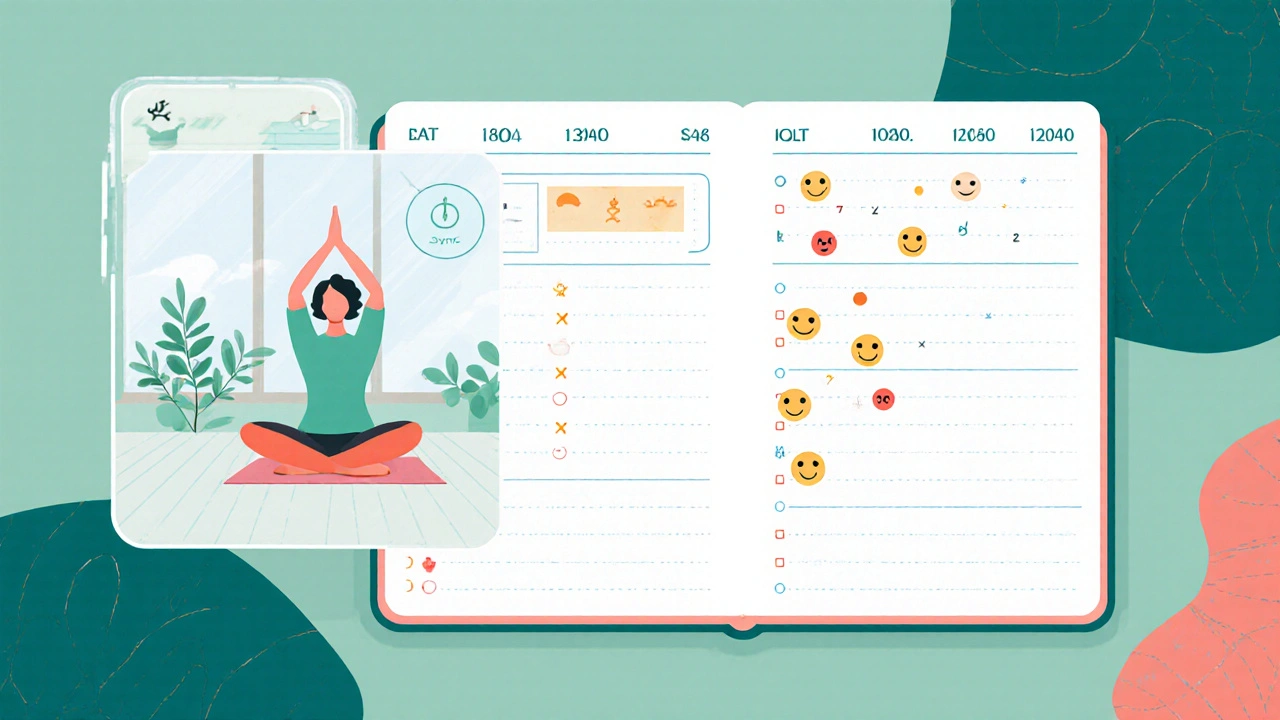Diabetes & Mental Health Risk Assessment
Assessment Overview
This tool helps identify potential mental health risks related to diabetes and suggests practical strategies for better co-management. Answer the questions below honestly to get personalized insights.
Your Assessment Results
Living with diabetes isn’t just about watching sugar levels-it’s also a mental challenge. Understanding the two‑way street between blood glucose and mood can help you avoid a spiral and stay on track with treatment.
Why the Link Exists
Research shows that people with Diabetes is a chronic metabolic disease that disrupts the body’s ability to regulate blood glucose are up to twice as likely to develop Depression is a mood disorder marked by persistent sadness, loss of interest, and fatigue. The biological culprits include rapid swings in glucose, which trigger stress hormones like Cortisol is a glucocorticoid released during stress that raises blood sugar and suppresses immune function. Elevated cortisol not only spikes glucose but also messes with neurotransmitters that regulate mood.
On the flip side, chronic Anxiety is a feeling of excessive worry that can interfere with daily activities can raise blood sugar by prompting the body to release adrenaline, which tells the liver to dump glucose into the bloodstream. Over time, this creates a feedback loop: poor glycemic control fuels anxiety, and anxiety makes control harder.
What the Numbers Say
Global surveys from 2023‑2024 estimate that about 30% of adults with Type 1 Diabetes is an autoimmune form diagnosed in childhood or early adulthood experience clinically significant depression, while the figure climbs to 35% for Type 2 Diabetes is a progressive condition linked to insulin resistance and lifestyle factors. Hospital admissions for self‑harm are also higher, underscoring the urgency of addressing mental health early.
Key Warning Signs
- Persistent low mood or loss of joy in activities you used to love
- Feelings of hopelessness about managing diabetes
- Changes in sleep or appetite that aren’t tied to glucose fluctuations
- Skipping insulin doses or oral meds because you “don’t feel like it”
- Physical tension, racing thoughts, or panic attacks before meals or glucose checks
If you notice two or more of these for several weeks, consider them red flags.
How Mental Health Directly Impacts Diabetes Management
When depression hits, motivation drops. That often means fewer Physical Activity is any bodily movement that burns calories and improves insulin sensitivity, poorer diet choices, and missed appointments. A 2022 Australian cohort study linked untreated depression to a 20% increase in HbA1c levels over 12 months.
Stress and anxiety also sabotage the pancreas. Short, intense stress bursts release adrenaline, which tells the liver to release stored glucose for a “fight‑or‑flight” response. For someone on insulin, this can cause unexpected lows if the dose isn’t adjusted.

Practical Strategies to Break the Cycle
- Track Mood Alongside Glucose - Use a simple journal or app to note feelings before and after blood‑sugar checks. Patterns often emerge that help you anticipate spikes or dips.
- Schedule regular CBT (Cognitive Behavioral Therapy) sessions - Studies show CBT reduces depressive scores by 30% in people with diabetes and improves medication adherence.
- Adopt a Balanced Diet rich in fiber, lean protein, and low‑glycemic carbs - Stable glucose reduces the physiological stress response.
- Incorporate Mindful Movement such as walking, yoga, or swimming - Even 20 minutes a day lowers cortisol and improves insulin sensitivity.
- Build a support network - Whether it’s a diabetes peer group, a mental‑health hotline, or a trusted friend, sharing worries reduces isolation.
- Review medications with your doctor - Some antidepressants can affect weight and glucose; a joint review ensures the regimen supports both conditions.
Comparison of Mental‑Health Risks in Type1 vs. Type2 Diabetes
| Factor | Type1 Diabetes | Type2 Diabetes |
|---|---|---|
| Average age of diagnosis | 12‑18 years | 45‑60 years |
| Prevalence of depression | ~30% | ~35% |
| Diabetes‑related distress | High (daily insulin management) | Moderate (lifestyle focus) |
| Impact of anxiety on glucose | Significant - insulin dose errors | Significant - medication timing |
| Common coping strategy | Peer support groups | Structured lifestyle programs |
When to Seek Professional Help
If mood symptoms interfere with daily tasks, cause self‑harm thoughts, or lead to repeated Insulin is a hormone that helps cells absorb glucose from the blood mismanagement, it’s time to involve a mental‑health professional. Many clinics now offer integrated care teams that include endocrinologists, psychologists, and diabetes educators.
Resources You Can Use Right Now
- National Diabetes Services Scheme (NDSS) - free webinars on mental‑wellbeing for people with diabetes.
- Beyond Blue - Australian mental‑health helpline (1300796091) that can connect you to specialists familiar with chronic illness.
- MySugr app - includes a mood‑tracking feature synced with glucose logs.
- Diabetes Australia’s “Living Well” program - offers peer‑support circles and CBT workshops.
Remember, tackling the diabetes and mental health connection isn’t a one‑off event. It’s a continuous partnership between your body, mind, and the people who support you.
Frequently Asked Questions
Can high blood sugar cause anxiety?
Yes. When glucose spikes, the body releases adrenaline to mobilize energy. That surge can provoke racing thoughts, a fast heartbeat, and a sense of dread-classic anxiety symptoms.
Is diabetes distress the same as depression?
Not exactly. Diabetes distress is specifically related to the burdens of managing the disease-like fear of hypoglycemia or frustration with insulin shots. Depression is a broader mood disorder that affects many life areas. Both need attention, but treatment approaches can differ.
Do antidepressants affect blood sugar?
Some do. Tricyclic antidepressants and certain SSRIs can cause weight gain, which may raise insulin resistance. Your doctor can choose a medication with a neutral metabolic profile.
How often should I check my mood?
A quick rating (1‑10) each day works for most people. If you notice a downward trend for a week or more, bring it up at your next medical appointment.
Can lifestyle changes replace medication for mental health?
Lifestyle improvements-regular exercise, balanced diet, adequate sleep-greatly boost mood and can lower the dose of antidepressants for some. However, they’re best used alongside professional treatment, especially when symptoms are moderate to severe.

Louie Lewis
October 4, 2025 AT 16:08The pharmaco‑industrial complex hides the true psychotropic benefits of glucose regulation.
Eric Larson
October 6, 2025 AT 01:28Wow, this article hits the nail on the head, and then some!!! The roller‑coaster of blood sugar spikes and mood swings is practically a sitcom, right?? But seriously, the data on cortisol‑driven anxiety is crystal clear-yet we keep ignoring it, like forgetting the plot twist in a drama series!!!
Kerri Burden
October 7, 2025 AT 10:48The bidirectional neuroendocrine axis linking hyperglycemia to affective dysregulation is well documented in the literature. Acute glucose excursions precipitate sympathetic overactivation, releasing catecholamines that modulate limbic circuitry. Conversely, sustained depressive phenotypes can attenuate insulin signaling pathways, exacerbating peripheral insulin resistance. This creates a self‑reinforcing feedback loop wherein metabolic instability fuels emotional volatility. Clinicians therefore must adopt an integrative assessment paradigm that synchronizes glycemic metrics with psychometric scales.
Continuous glucose monitoring (CGM) data, when annotated with daily mood diaries, reveal temporal correlations that are otherwise obscured. Moreover, psychopharmacologic agents such as selective serotonin reuptake inhibitors have heterogeneous effects on hepatic gluconeogenesis. Some SSRIs modestly improve glycemic control, whereas others may induce weight gain, complicating the therapeutic calculus. Lifestyle interventions, especially aerobic exercise, have dual efficacy: they augment insulin sensitivity and upregulate brain‑derived neurotrophic factor, mitigating depressive symptoms. Nutritional strategies emphasizing low‑glycemic index carbohydrates reduce postprandial glucose spikes, dampening cortisol surges. Sleep hygiene cannot be overstated; fragmented sleep amplifies hypothalamic‑pituitary‑adrenal axis activity, aggravating both hyperglycemia and anxiety. Social support networks function as psychosocial buffers, lowering perceived diabetes distress scores. Integrated care models that embed psychologists within endocrine clinics demonstrate a statistically significant reduction in HbA1c over 12 months. Patient‑reported outcomes in such models also show a 30 % decrease in depressive symptomatology. Therefore, a multidisciplinary treatment algorithm is paramount for optimizing both metabolic and mental health trajectories. In practice, this translates to routine cross‑referrals, co‑prescription of behavioral therapies, and vigilant monitoring of psychotropic‑induced metabolic side effects.
Joanne Clark
October 8, 2025 AT 20:08Honestly, the whole discourse feels like a low‑brow lecture from a wannabe scientis.
George Kata
October 10, 2025 AT 05:28Hey Eric, you’re spot on about the drama, but let’s also remember that evidence‑based interventions-like CBT and structured glucose logging-can cut through the noise and actually improve outcomes.
Even a simple mood‑glucose chart can reveal patterns that look like plot twists at first glance.
Nick Moore
October 11, 2025 AT 14:48Totally agree, the connection isn’t just scary-it’s a chance to level up our self‑care game! Small steps like a 10‑minute walk after meals or a quick journal entry can build momentum, and before you know it those tiny wins stack into huge confidence gains.
Jeffery Reynolds
October 13, 2025 AT 00:08Your advice is solid, Nick, and it aligns with the broader public‑health emphasis on preventive care that benefits our nation’s productivity.
Mitali Haldankar
October 14, 2025 AT 09:28Actually, I think people over‑medicalize everything 🙄-maybe they should just chill and let the body sort itself out 🤷♀️.
snigdha rani
October 15, 2025 AT 18:48Sure, because ignoring blood‑sugar spikes has never led to complications, right? 🙃
Mike Privert
October 17, 2025 AT 04:08Let’s keep it real: tracking your glucose and mood isn’t about paranoia, it’s about empowerment. A quick note in your phone each evening can give you the data you need to make smarter choices tomorrow.
Veronica Lucia
October 18, 2025 AT 13:28The interplay between metabolic homeostasis and affective equilibrium invites us to view health as a holistic narrative rather than disjointed chapters, reminding us that mind and body are inseparable storytellers.